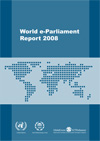|
|
World e-Parliament Report 2008
In recent years, parliaments have begun to exploit advances in information and communication technologies (ICT) to support their many functions and modernize their institutions. However, to date, there has not been an assessment on how these technologies are being employed across the array of activities for which a parliament is responsible.The World e-Parliament Report 2008 represents a first effort to establish a baseline of how parliaments are using, or planning to use ICT to help them fulfill their responsibilities and to connect to their constituencies. The Report also provides an opportunity for sharing lessons learned and good practices from different regions of the world. In recent years, parliaments have begun to exploit advances in information and communication technologies (ICT) to support their many functions and modernize their institutions. However, to date, there has not been an assessment on how these technologies are being employed across the array of activities for which a parliament is responsible. The World e-Parliament Report 2008 represents a first effort to establish a baseline of how parliaments are using, or planning to use ICT to help them fulfill their responsibilities and to connect to their constituencies. The Report also provides an opportunity for sharing lessons learned and good practices from different regions of the world. The Report is based on the responses and comments provided by 105 assemblies from around the world to a survey on the use of ICT in parliament c he Report is based on the responses and comments provided by 105 assemblies from around the world to a survey on the use of ICT in parliament conducted between July and November 2007. It also draws on experiences exchanged during the World e-Parliament Conference 2007 and relevant publicly available information. The WePR 2008 was launched on the occasion of the second high-level meeting of the Board of the Global Centre for ICT in Parliament. In recent years, parliaments have begun to exploit advances in
information and communication technologies (ICT) to support their many
functions and modernize their institutions. However, to date, there has
not been an assessment on how these technologies are being employed
across the array of activities for which a parliament is responsible.The World e-Parliament Report 2008
represents a first effort to establish a baseline of how parliaments
are using, or planning to use ICT to help them fulfill their
responsibilities and to connect to their constituencies. The Report also
provides an opportunity for sharing lessons learned and good practices
from different regions of the world.
|













